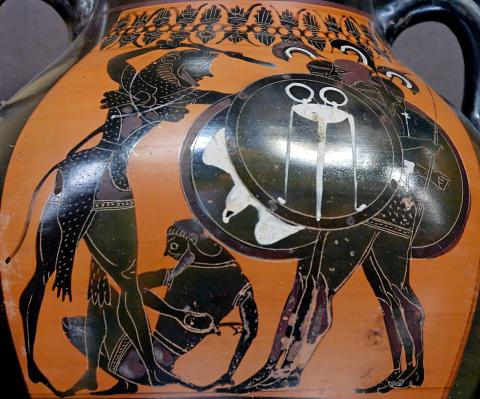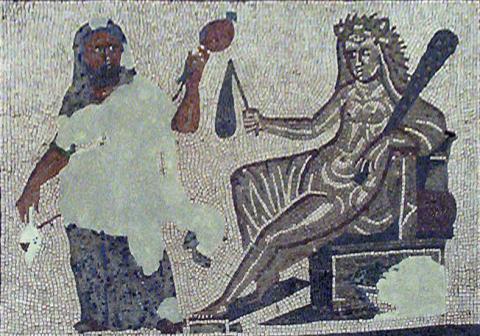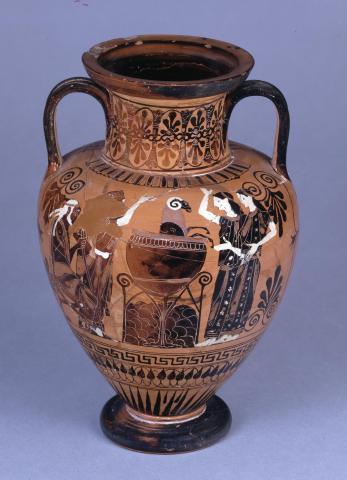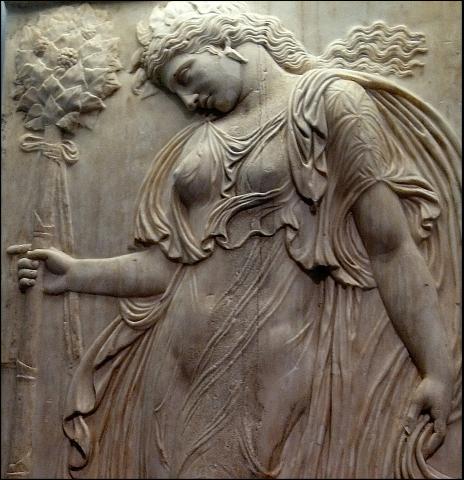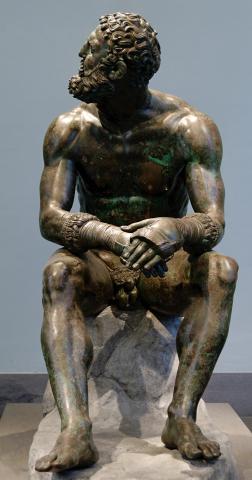LYC. Quemcumque miserum vīderis, hominem sciās.
AM. Quemcumque fortem vīderis, miserum negēs.
LYC. Fortem vocēmus cuius ex umerīs leō,465
dōnum puellae factus, et clāva excidit
fulsitque pictum veste Sīdoniā lātus?
fortem vocēmus cuius horrentēs comae
maduēre nardō, laude quī nōtās manūs
ad nōn virīlem tympanī mōvit sonum,470
mitrā ferōcem barbarā frontem premēns?
AM. Nōn ērubēscit Bacchus effūsōs tener
sparsisse crīnēs nec manū mollī levem
vibrāre thyrsum, cum parum fortī gradū
aurō decōrum syrma barbaricō trahit;475
post multa virtūs opera laxārī solet.
LYC. Hoc Eurytī fatētur ēversī domus
pecorumque rītū virginum oppressī gregēs.
hoc nūlla Iūnō, nūllus Eurystheus iubet:
ipsīus haec sunt opera.
AM. Nōn nōstī omnia:480
ipsīus opus est caestibus frāctus suīs
Eryx et Erycī iūnctus Antaeus Libys,
et quī hospitālī caede mānantēs focī
bibēre iūstum sanguinem Būsīridis;
ipsīus opus est vulnerī et ferrō invius485
mortem coāctus integer Cycnus patī,
nec ūnus ūnā Gēryōn victus manū.
eris inter istōs — quī tamen nūllō stuprō
laesēre thalamōs.
Notes
With a pair of matching sentences, the argument shifts from Hercules as sufferer (miser) to Hercules as strong, brave, and manly (fortis). Lycus describes Hercules’ cross-dressing in the service of the Lydian queen Omphale to accuse him of effeminacy. Amphitryon counters that Bacchus also presents an effeminate appearance. Lycus then alludes to Hercules’ notorious lust, specifically citing his rape of Iole. Amphitryon does not directly answer the charge, but instead describes various monsters and tyrants that Hercules has defeated, suggesting that the tyrant Lycus will be the next in line.
463–64 sciās … negēs: jussive subjunctives. Understand esse after each verb. The sharp exchange of sententiae heightens the dramatic flow of the dialogue. These two sententiae were frequently adapted in later centuries. The idea that humans (as opposed to gods) are wretched is common in Greek and Latin literature before Seneca. The idea in the second sententia relies on the Stoic doctrine that a vir bonus (who is, among other things, fortis) is necessarily “happy,” in the philosophical sense of blessed, whatever his physical circumstances
465–71 Lycus objects that Hercules cannot be called brave, since he once dressed as a woman in service to Omphale, queen of Lydia. The Llíria mosaic shows the story.
465 vocēmus: deliberative subjunctive (AG 444), “are we to call…?” leō: metonymy for Hercules’ lion-skin. The verb is excidit in the next line.
466 dōnum puellae factus: although factus is masculine to agree with leō, it should also be taken with clāva: Hercules let Omphale use both his lion-skin and club. Omphale was the adult queen of Lydia, and thus not a puella in the literal sense; rather, this is the language of elegy, in which the male lover has a puella, “sweetheart” or “girlfriend.” But Lycus’s tone is pejorative in describing the great Hercules enslaved to a “girl.”
467 pictum … lātus: Hercules’ “side” (metonymy for “body”) is described as “brightly decorated” with his exotic women’s clothing. Pictum usually means “embroidered” and applies properly to the garment, not the body, so this could also be seen as a transferred epithet. veste Sīdoniā: Sidon was known in antiquity for producing the expensive purple dye favored by royalty.
469 maduēre: for the form, see line 17. nardō: nard, also called spikenard, is an aromatic essential oil produced in the Near East and used in perfume; the perfume would have been a solid unguent or paste rubbed into the hair. laude … nōtās: “renowned,” i.e., for his heroic deeds.
469–70 manūs … mōvit: this phrase could refer to dancing, but other depictions of Hercules and Omphale focus on him spinning wool (Ovid, Ars Amatoria 2.217–18 inter Iōniacās calathum tenuisse puellās / crēditur, Hercules “is believed to have held the wool basket among Ionian girls.”) Spinning is described as being accompanied by music as early as Homer.
471 mitrā: a woman’s headdress, associated especially with Lydia. An example is depicted in a black-figure amphora now in the British Museum.
472–76 The description of Bacchus’effeminate hairstyle and hand movements and exotic dress answers the description of Hercules at 465–71. Bacchus was typically represented as effeminate, as suggested by tener, mollī, levem, and parum fortī. But he also had a fearsome aspect, exemplified in particular by his conquest of India (alluded to in 76).
472–74 There is a similar description of Bacchus’s worshipers at Seneca, Oedipus 439–41 mātrēs / fūdēre comam / thyrsumque levem vibrante manū.
472 nōn ērubēscit: followed by the infinitives sparsisse and vibrāre, listing activities that Bacchus “does not blush” to do.
472–73 effūsōs … sparsisse crīnēs: the participle focuses on the length of Bacchus’s hair (so that it “hangs down” over his neck); the infinitive focuses on its lack of styling (so that it is “scattered” freely).
473–74 sparsisse, vibrāre: the different tenses of the infinitives allow two verbs with the same metrical shape to begin successive lines (other tenses of the infinitive, spargere and vibrāvisse, would not have fit here).
474 thyrsum: a long fennel stalk used in the worship of Bacchus, depicted on a second-century Roman relief now in the Prado Museum, Madrid. parum fortī gradū: “insufficiently manly step.” As any fan of RuPaul’s Drag Race knows, walking is a gendered activity. Cf., e.g., Seneca, Epistulae 114.3 nōnne vidēs … sī ille effēminātus est, in ipsō incessū adpārēre mollitiam (“do you not see that if a man is effeminate, his softness will be evident even in the way he walks?”)
475 syrma … trahit: Hercules wears a long loose robe (from the Greek neuter noun σύρμα) that trails on the ground. The verb probably alludes to the etymological connection between σύρμα and σύρω (“to drag”).
476 laxārī: “to relax (itself).” The statement that virtūs takes time to relax post multa … opera can be applied specifically to Bacchus if we imagine him celebrating after conquering India. It is also meant to apply to Hercules—although Seneca’s audience might not have been convinced by the proposition that spending time as the cross-dressed slave of a Lydian queen counts as simple “relaxation.”
477–80 Lycus argues that Hercules takes the relaxation of his virtūs too far, as evidenced by his many assaults on women (virginum oppressī gregēs). His specific example is Hercules’ abduction of Iole, daughter of Eurytus. Sophocles tells this story in his tragedy Women of Trachis; see in particular Trach. 375ff. Because the abduction of Iole occurs near the end of Hercules’ life, it is technically anachronistic for Lycus to reference it here. But Hercules’ mythology was sufficiently fluid that it is unlikely for an ancient audience to have been bothered by this. Our evaluation of Lycus’ charge that Hercules is a serial rapist requires a careful and critical reading of Hercules’ confused mythology. We should remember, in particular, that the myths were produced by ancient cultures that lacked an understanding of sexual consent. Furthermore, they were often related by narrators with a vested interest in portraying Hercules positively and, more broadly, maintaining the status quo of the elite male power structure. Amphitryon, as an elite male and Hercules’ father, is certainly not an unbiased narrator. We now understand many of Hercules’ sexual encounters as rapes, even in some cases where ancient sources lacked this understanding: for instance, when the fifty daughters of Thespius have sex with Hercules at their father’s command. But in several cases, ancient authors are more explicit in characterizing Hercules’ actions. For instance, at Ovid, Heroides 9.49, Hercules’ wife Deianira describes Auge (mother of Telephus) as “defiled” (temerāta) by Hercules. At Sillius Italicus, Punica 3.415-41, the narrator describes the rape of Pyrene by a drunken Hercules, explicitly calling him a “rapist” (raptor); subsequently abandoned by Hercules, Pyrene fled her home and was torn apart in the wilderness by animals (Seneca knew Silius as a fellow member of Nero’s court). Hercules’ rapes were treated in different ways by various ancient speakers with different agendas, and here Lycus is certainly speaking with the intention of disparaging his enemy Hercules. But this should not blind us to the reality of Hercules’ behavior.
477 hoc: accusative, referring to the idea that Hercules is not fortis. fatētur: “attests.” ēversī: “overthrown,” a transferred epithet which would more logically describe domus instead of Eurytī.
478 rītū: “in the manner of” + gen. (LS ritus II.A.α). The suggestion is that Hercules is as promiscuous as a barnyard animal. virginum … gregēs continues the animal metaphor. oppressī: masculine in agreement with gregēs, but referring to girls (virginum). opprimō does not usually mean “have intercourse with” (unlike the related premo or comprimo), but rather “overwhelm, crush,” often in a military sense. Lycus is using military language to imply that Hercules’ heroism consists mainly of shameful sexual “conquests” of defenseless virginēs.
480 ipsīus haec sunt opera: responds to 476 post multa … opera and is answered in turn by ipsīus opus est at 481 and 485. ipsīus = “of the man himself,” i.e. “undertaken of his own accord,” “genuinely his” (LS ipse II.B).
480–88 Amphitryon does not defend Hercules against the charge of being a serial rapist. Instead, he refocuses the conversation on Hercules’ role as civilizer. Amphitryon alludes to Hercules’ defeats of the boxer Eryx, the wrestler Antaeus, Busiris who sacrificed his guests, the invulnerable Cycnus, and the three-bodied monster Geryon. Most of these figures were tyrants like Lycus, and their fates anticipate, as Amphitryon suggests, that of Lycus (488 eris inter istōs).
480 nōstī: syncopated form of nōvisti > noscō.
481 caestibus ... suīs: caestūs refers literally to hard leather boxing gloves, sometimes reinforced with metal, designed not only to protect the hands but also to increase the damage of a blow (seen on the bronze statue in the Palazzo Massimo alle Terme, often called the Thermae Boxer); by metonymy caestūs = “boxing.” suīs suggests that Hercules beat Eryx at “his own” game.
482 iūnctus: that is, Antaeus shared in Eryx’s fate.
483 quī … focī: = focī quī, “the altar which…” Busiris sacrificed his guests, and so his altar dripped with their blood. hospitālī caede: “the slaughter of guests” (abl. after mānantēs).
484 bibēre: syncopated perfect = bibērunt. iūstum sanguinem: “justly spilled blood.”
485 vulnerī et ferrō: a hendiadys meaning “wounds from weapons,” both datives with the adj. invius, “impervious to.” Cycnus could not be wounded, and so Hercules killed him by strangulation. Seneca has conflated Cycnus, son of Neptune, who was invulnerable and ultimately strangled to death by Achilles, and Cycnus, son of Mars, who was slain by Hercules but was not invulnerable. %% Confusion about what Seneca is describing here caused invius to be corrupted into roughly its opposite, obvius, “exposed to” (e.g., Par. Lat. 11855, 4th column, 11th line from the bottom); the corrected text was restored by the Dutch scholar Nicolaas Heinsius.
486 mortem coāctus … patī: “forced to suffer death.” integer: i.e., without any visible wound, because he was strangled.
487 After the paradox of dying while integer, we have another striking idea that relies on number games (a frequent feature of Latin poetry): because Geryon had three heads (seen on a black-figure amphora now in the Louvre), he was “not one” (nec ūnus) enemy, but was defeated by Hercules alone (ūnā … manū).
488–89 quī ... thalamōs: Amphitryon ranks Lycus’ defiling Megara’s marriage-bed as worse than the crimes of all the other villains just listed. Somewhat boldly, Amphitryon answers Lycus’ (accurate) charge that Hercules has assaulted many women by highlighting Lycus’ own plans to take Megara by force. But there would have been a difference in Roman law between Megara, a married and thus unavailable woman, and Iole, an unmarried woman and thus technically available (even if her father Eurytus did not want her to marry Hercules).
488 nūllō stuprō: as often, nūllus is used instead of a more general negative like nōn or numquam.
489 laesēre: syncopated perfect = laesērunt > laedō, “harm,” “infringe upon” her marriage (thalamōs) to Hercules.
Vocabulary
umerus –ī m.: shoulder
leō leōnis m.: lion
clāva –ae f.: a club
excidō excidere excidī: to fall out, drop; perish; be forgotten
fulgeō fulgēre fulsī: to flash, glitter; shine, shimmer
pingō pingere pīnxī pictus: to paint, embroider
Sīdōnius –a –um: Sidonian; Tyrian
horreō –ēre –uī: to shake, bristle; dread, fear
madeō –ēre –uī: to be wet, be damp
nardus –ī f. or nardum –ī n.: nard-oil
virīlis –e: manly
tympanum –ī n.: drum
sonus –ī m.: sound
mitra –ae f.: headband; turban
ferōx ferōcis: bold; wild
ērubēscō ērubēscere ērubuī: to grow red, blush
Bacchus –ī m.: Bacchus; Bacchant; wine
crīnis crīnis m.: hair
vibrō –āre –āvī –ātus: to shake
thyrsus –ī m.: the stalk of a plant; a staff wreathed with ivy and vine–leaves
Syrma –ae f.: a robe
barbaricus –a –um: foreign, barbaric
laxō –āre –āvī –ātus: to spread out; open up; relax
Eurytus –ī m.: Eurytus
ēversus –a –um: overthrown
rītus rītūs m.: a form of religious ceremonial, rite; custom, manner
opprimō opprimere oppressī oppressus: to press on or down; overwhelm
grex gregis m.: herd, flock
Iūnō Iūnōnis f.: Juno
Eurystheus Eurystheī m.: Eurystheus, king of Mycenae
caestus caestūs m.: gauntlet, boxing-glove
Eryx Erycis m.: Eryx
Antaeus –ī m.: Antaeus
Libycus –a –um: Libyan
hospitālis –e: hospitable; of a guest
mānō –āre –āvī –ātus: to drip, flow
focus –ī m.: fireplace; hearth, altar
bibō bibere bibī: to drink
Būsīris Būsīridis m.: Busiris
invius –a –um: without a way, impassable; impervious
cōgō cōgere coēgī coāctus: to collect, bring together; force, compel
Cycnus –ī m.: Cycnus
Gēryōn Gēryōnis or Gēryonēs Gēryonae m.: Geryon
stuprum –ī n.: violation
thalamus –ī m.: marriage bed; bedchamber

